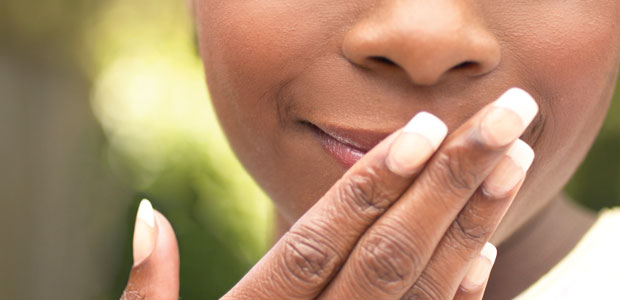Advertisement
Oral Thrush
A natural approach to candida

A co-worker developed a white film and deep grooves on her tongue, prompting a visit to her health care practitioner. The diagnosis: Candida albicans, or oral thrush.
Although oral thrush is considered a common condition, it is one that can prove uncomfortable and difficult to rid the body of—something my friend quickly discovered.
What causes oral thrush?
Often, a course of antibiotics is enough to throw our naturally occurring good bacteria out of balance, potentially resulting in an overgrowth of the bad kind on our tongues.
“Candida albicans just takes over the mouth, and there’s pain and inflammation because the mucous membranes can’t protect themselves,” says Chantelle Drobot, naturopathic doctor at the Integrative Health Centre in Calgary, Alberta.
“The causes are usually medications like corticosteroids, antibiotics, and drugs used in chemotherapy treatment that reduce the good bacteria in the mouth. Diabetes sufferers are especially prone to thrush from sugar changes in the bloodstream leading to an overgrowth of candida.”
Drobot says that even pregnancy, with the surging amounts of progesterone in the body, can be enough to alter blood sugar levels in the body. She also advises keeping stress under control, as it can further compromise an already weakened immune system.
Looking at the bigger picture
A diagnosis of oral thrush doesn’t mean that symptoms are necessarily limited to the mouth. “When we look at thrush, we look at a systemic candida problem; we rarely focus on just oral,” says Tasreen Alibhai, naturopathic doctor and medical director of Vitalia Health Care and the Canadian Hyperbaric Institute in Vancouver.
“Candida albicans is normally in balance in the body, but when the immune system is weakened candida can take over. Also, when somebody has food allergies or intolerances, eating the foods their immune system reacts to along with an imbalance of candida can lead to conditions like thrush.
It’s also a signal that there is something going on in the body that’s manifesting itself on the tongue. We believe in treating the body as a whole, not just the individual symptoms.”
Is oral thrush contagious?
Sharing a glass with someone battling a case of oral thrush is unlikely to cause the condition to spread to you. Kissing, however, can bring different results. “Oral thrush is contagious, but it depends on your own bacterial balance and the strength of your immune system at that particular time,” says Drobot. “It’s not guaranteed that if you’re exposed to it you will develop oral thrush, but it is transferable.”
Babies are especially at risk
It can be quite a shock to discover your newborn with a case of thrush. Babies who are delivered vaginally are inoculated with healthy bacteria, giving them an advantage over babies born through cesarean section. Sometimes these babies’ immune systems are underdeveloped and an imbalance in their natural levels of Candida albicans can cause oral thrush.
Breastfeeding babies who develop oral thrush may pass this on to their mothers, whose nipples can become infected, creating a back and forth infection if both aren’t treated.
Natural remedies plus time equals results
It’s important to visit a naturopathic doctor at the first signs of oral thrush. Treatment is usually quite simple and straightforward, using a combination of common naturopathic remedies.
“I use grapefruit seed extract, which is antifungal in nature,” says Drobot. “It’s not as hard on the liver as conventional medical prescriptions for yeast infections can be, so we can safely use this treatment for a month. It’s available in drops or tablet form depending on what the patient prefers. I always prescribe a probiotic (acidophilus) to use at the same time to put back the good bacteria.”
Alibhai follows a similar prescription, with a twist: “grapefruit seed extract with a few drops of oil of oregano in some water, gargled and swallowed.” Alibhai finds this combination paired with a probiotic and raw garlic or garlic pills quick and effective. “I once treated a flight attendant who had tried everything to manage her oral thrush. She had very noticeable results in only three days after following my treatment.”
Both doctors also feel that reducing a patient’s intake of milk, wheat, and sugar can help curb candida symptoms until the balance between good and bad bacteria is restored.
An ounce of prevention
Our body’s flora is constantly changing and something as common as antibiotics can tip our bacterial scale too far out of balance, resulting in oral thrush. There are some things we can do, however, to ensure our good bacteria levels remain in check.
“[Those taking antibiotics] need to be taking a probiotic at least three times a week to bring back some [good] bacteria,” says Drobot. “Antibiotic use skyrockets during the winter, so invest in a good probiotic and encourage all family members to take it.”
Drobot also recommends limiting sugar and alcohol intake, which may exacerbate the condition, as well as monitoring stress levels and making adjustments when external demands start piling up.
Responsible for identifying the flavourful nuances in a gourmet meal or picking out the delicate notes of a fine Riesling, the tongue is possibly one of the most overlooked organs in the body. While some health conditions affecting the tongue are simple to treat, others are not. It’s important to pay attention to even the smallest changes, which could turn into painful and temporarily debilitating conditions if left unchecked.




